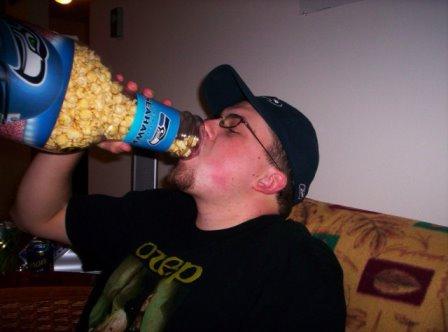As you all know, I'm a huge baseball fan. Always have been. And as a fan I find it deplorable when yet another player tests positive for performance-enhancing drugs. On Saturday Sports Illustrated broke the story that Alex Rodriguez, formerly of the Seattle Mariners, tested positive for PEDs in 2003, the year he won his first MVP award. Monday, in an interview with ESPN, Rodriguez admitted to taking PEDs from 2001-2003 (watch the whole interview here).
As stated above, I find all incidences of athletes taking performance-enhancing drugs to be deplorable. As a sports fan, I have a deep respect for the history of the game. Athletes of old used their natural talent to accomplish their feats, and modern athletes are ruining their legacy. Especially in baseball, where the commissioner's office and the player's union looked the other way for years before public outrage and a Congressional hearing forced them to adopt tougher steroid policies. Before the 2006 season, baseball's penalty for testing positive for steroids were as follows: 10 days for the first offense, 30 days for a second, and 60 days for a third. Note that the penalty is days, not games. Also note that the baseball season is 162 games over approximately six months. A lifetime ban was only possible after the fifth offense. Currently, the steroid policy is: 50 games for a first offense, 100 games for a second, and a lifetime ban for the third. Much better.
Which brings me back to A-Rod and his admission of guilt. He is the highest-profile baseball player to admit to steroid use. Most do not, despite massive amounts of evidence to the contrary (Barry Bonds, Roger Clemens, Mark McGwire, Rafael Palmeiro, Miguel Tejada, among others). Therefore, I do not have as much disdain for him as I do for the others. However, his actions were still unconscionable. Plus, I don't necessarily buy his statement that he stopped using after 2003.
He didn't even have to start using steroids. Look at his numbers from 1996-2000, when he played with the Seattle Mariners:
1996: .358 Batting average, 36 home runs, 123 runs batted in
1997: .300 BA, 23 HR, 82 RBI
1998: .310 BA, 42 HR, 124 RBI
1999: .285 BA, 42 HR, 111 RBI
2000: .316 BA, 41 HR, 132 RBI
Even his worst year, 1997, is a great year by 95% of the players in the majors. He didn't have to start using, he was already the best player in the game. But look at his stats from 2001-2003, when he played with the Texas Rangers:
2001: .318 BA, 52 HR, 135 RBI
2002: .300 BA, 57 HR, 142 RBI
2003: .298 BA, 47 HR, 118 RBI
A noticeable increase in home runs (RBIs aren't necessarily about power as much as they are about hitting with runners on base).
So, is A-Rod a Hall of Famer? Despite the admission of guilt, I say no. He cheated. He knew he was cheating. He shouldn't be in the Hall of Fame alongside those players who played by the rules. He just tarnished his legacy.
Subscribe to:
Post Comments (Atom)

Great post, Mike. I completely agree with you. It gets me that he lied to Katie too. You just shouldn't lie to Katie. Not nice.
ReplyDeleteI just read a great article by Sports Illustrated's Tom Verducci on this subject. He brings up some interesting points about A-Rod's interview with ESPN.
ReplyDelete